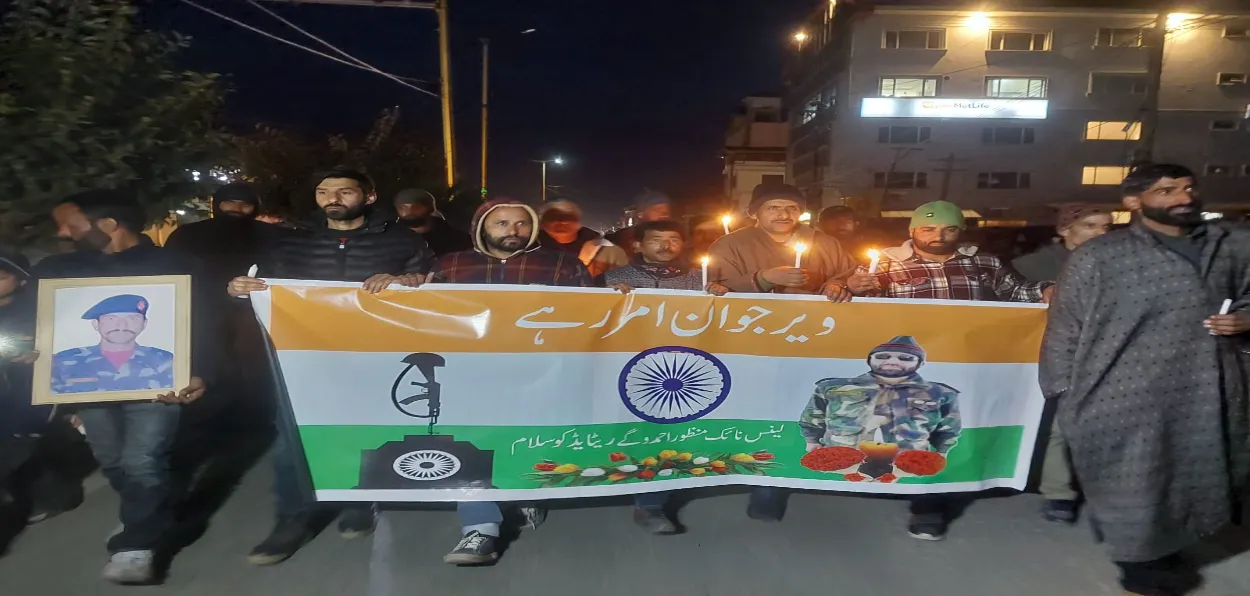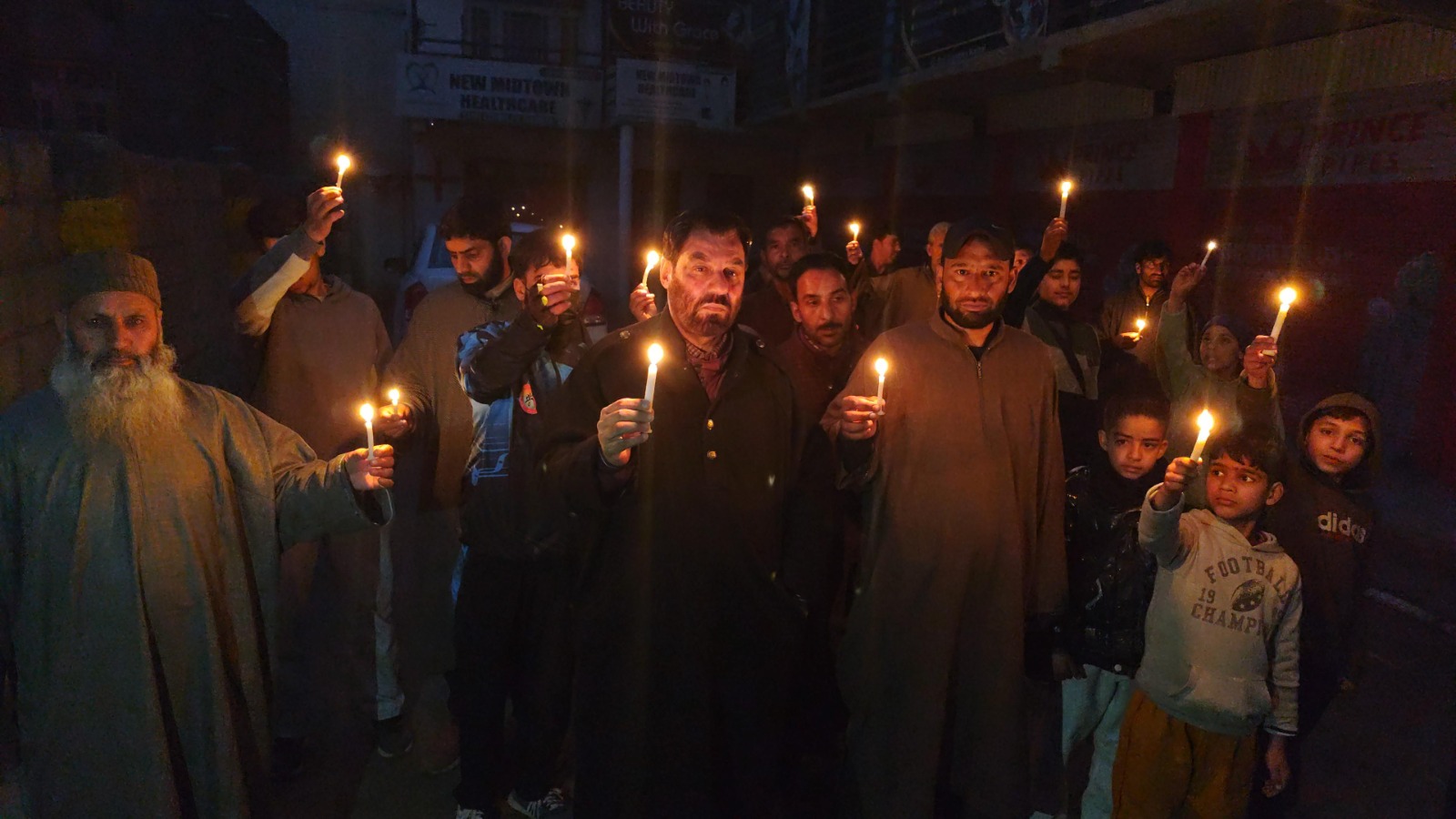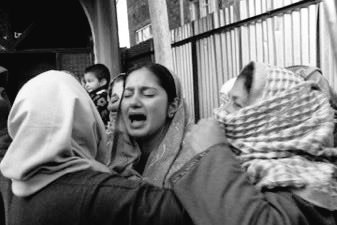
Danish Ali/Srinagar
In the small and serene village of Behibagh in the Kulgam district, located about 70 km south of Srinagar city, grief has turned like an unrelenting storm. Once alive with the daily hum of life, the village echoes with cries of sorrow and pain. The air is thick with sadness, and the people find themselves amid unbearable loss.
On February 3 evening, violence knocked on the door of Manzoor Ahmad Waghey, a 39-year-old ex-army man who had once protected his country and was now leading a retired life.
Suspected terrorists opened fire on his family, leaving him his wife, Aina Akhtar, 32, and niece, Saina Hameed 13, injured. Waghey died of the injuries in hospital while other two remain hospitalized.
A political activist Javed Beigh posted these images of the grieving family on X:
As the news of Manzoor’s killing spread, the villagers came together, not just as mourners but as a community united in grief, anger, and to seek justice.TEARS OF KASHMIRI MUSLIM DAUGHTERS OF INDIA:
— Javed Beigh (@JavedBeigh) February 4, 2025
"We seek justice for our martyred father from the Government of India and support from our fellow Indians".
1/2 ....
These are exact words of daughters of Manzoor Ahmad Wagay, a retired Indian Army man from Kashmir's extremely… pic.twitter.com/5WfiVV6JDw
Manzoor was a Rifleman in the Army and retired in 2021. He was into cattle business and lived peacefully with his family till the terrorists struck. he had four children - three sons and one daughter.
“He was a brave man who never turned away from his duty,” said an elderly villager.“He wanted to live in peace. Why did they take him away from us?”
Neighbours remember Manzoor as the most helpful neighbor - be it fixing a broken fence, assisting an elderly farmer, or offering comfort to someone in distress – he was there. “He was the kind of man who would never say a no,” said his childhood friend.
His wife, Aina, lay on a hospital bed, clutching the memories of her husband. “He just wanted a simple life,” she whispers through her tears. “He didn’t deserve this.”
 Protests in Kulgam against the killing of ex serviceman Manzoor Ahmed Waghey
Protests in Kulgam against the killing of ex serviceman Manzoor Ahmed Waghey
If the grief of the village could be embodied in one person, it would be Zainab, Manzoor’s mother. She sits on the floor of their home, rocking back and forth, her eyes swollen from crying.
“I don’t want compensation,” she cries her voice barely above a whisper and loaded with pain. “I want justice. I want my son back.”
From among the neighbours someone holds her hand; the other wipes a tear from her eyes.
The funeral was unlike anything Behibagh had seen in years. Hundreds gathered, men and women, young and old, with sad countenance. Some carried banners calling for justice; others simply stood in silence, unable to process the turn of events.
Manzoor’s body was carried through the village one last time. The wails of the grieving filled the air as his loved ones bid him farewell. “He should have lived,” murmured an elderly man, watching from the side. “He should have grown old here, with his children. This is not fair.”
 A relative mourning Waghey's killing
A relative mourning Waghey's killing
Children who once played in the streets watched the funeral procession with wide, tear-filled eyes. They had known Manzoor as the kind uncle.
The tragedy did not go unnoticed at the highest levels of leadership. Prime Minister Narendra Modi called the grieving Waghey family, condemning the attack and calling it a cowardly act of terror. He assured them of the government’s support, promising that those responsible would face justice.
“We appreciate the call,” said one of his relatives. “But what we want is an end to this violence. No more sons should die like this.”
The people of Behibagh, like many across Kashmir, are exhausted by violence. They have seen too many lives lost, too many families torn apart. This time the loss is more personal. Manzoor was one of their own. He had lived with them, laughed with them, dreamed with them.
Manzoor Ahmed Waghey's son speaking to the media
“This is not just about Manzoor,” said a local shopkeeper, his voice thick with emotion.“This is about all of us. How long will we continue to bury our sons?”
The village has vowed to seek justice and ensure that Manzoor’s death does not become just another statistic. They want accountability; they want answers, and most of all, they want peace.
“We cannot afford to lose more of our people,” said a young man at the funeral. “We will not let Manzoor’s death go in vain.”
ALSO READ: Kifayatullah Malik is sending dropouts back to school in Kashmir
Manzoor Ahmad Waghey leaves a legacy of love, courage, and resilience for his children. Surely they would grow up hearing stories of their father’s kindness, bravery, and patriotism.
